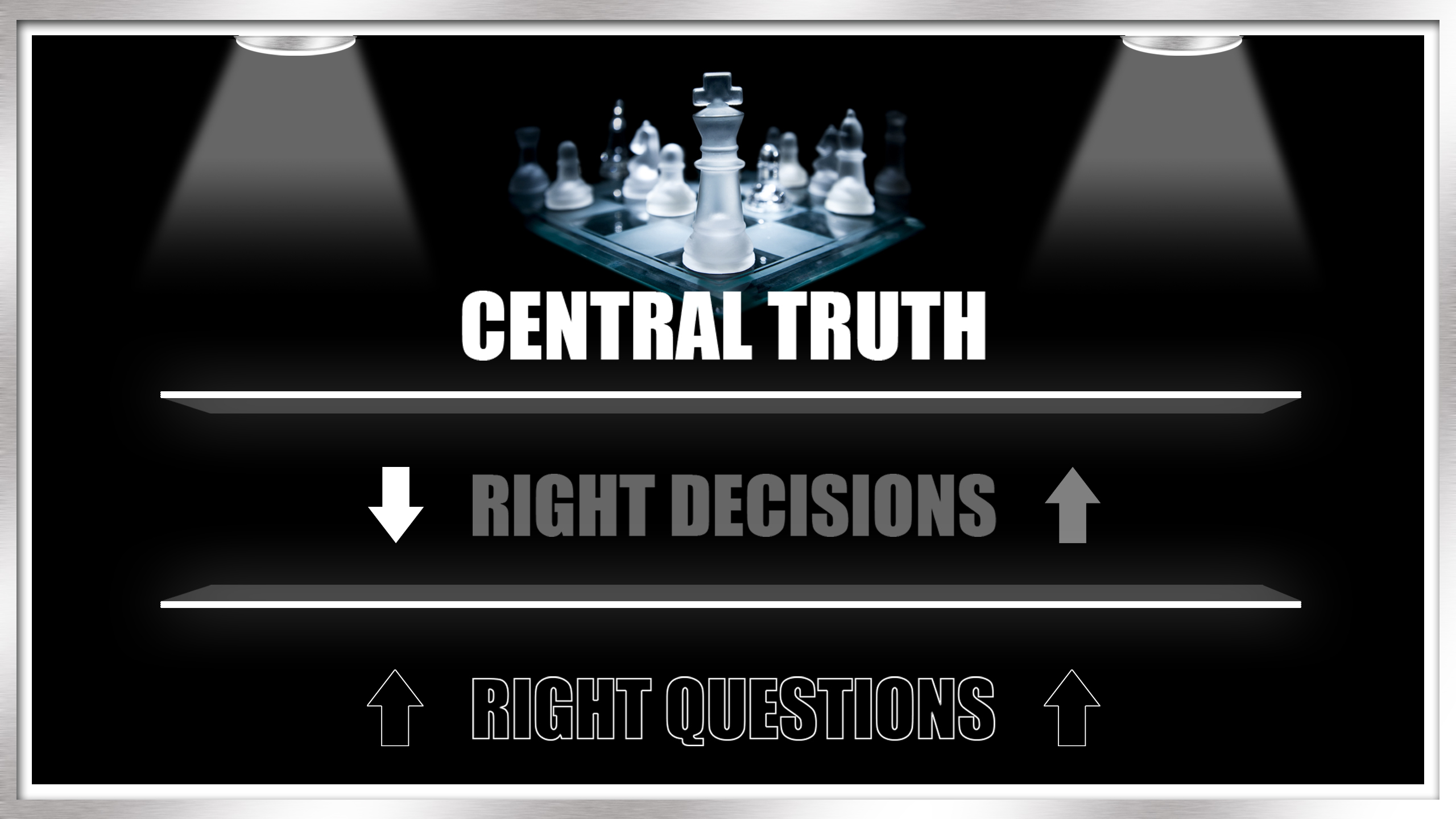That’s Your Opinion | Part I
I) Here’s Your Challenge

You have a perspective on a particular issue that when it’s put into practice results in a world of pain and problems.
Yet, it’s something that falls in line with your preferences, so now you have a dilemma…
How do you champion your viewpoint without sounding either outrageously selfish or absurd?
Part of what makes this especially challenging is that you have to retool the very definition of all that’s right, good, moral and just. If you are to successfully position your viewpoint as something that is comparable to every other approach, despite its flaws and liabilities, you’ve got to introduce some new standards in order to make your platform look credible.
You have to be your own absolute.
But it’s really not that hard.
All you need to do is use one of several phrases that frame the debate in a way where you are perceived as someone who’s merely advocating an environment where everyone’s opinion is credible. Now you can not only win the debate, but you can also make every other opposing mindset look sinister because those who are on the outside looking in aren’t hearing your opponent challenge your logic. Rather, they’re hearing them as being against the very concepts of compassion and understanding.
You have a number of comments to choose from:
- Everyone is entitled to their opinion.
- Not everyone feels that way.
- You can’t force your beliefs on me.
- Separation of Church and State.
Every one of these phrases has one thing in common: It changes the way you’re now no longer heard as someone trying to justify themselves. Instead, you’re heard as someone being “forced” to subscribe to something you don’t agree with.
You are a victim of a totalitarian system, and now you can’t be criticized or corrected.
The focus is now neither on the subject matter nor on the flaws of your argument. Rather, it’s on the character of the person who’s daring to question the validity of your approach because of the way you’ve been able to characterize them as overbearing and intolerant.
The direct line of questioning that has the capacity to reveal the flaws of your argument…?
Silenced.
The challenge of having to account for the damage done by the approach you subscribe to?
Not your responsibility.
No one wants to be labeled intolerant or judgmental or homophobic or racist…
So, in the context of one, well timed comment, you can shift the attention away from what’s being discussed and instead focus on the apparent character flaws of those who disagree with you. And in no time at all, you create a level of intimidation to the point where no one wants to say anything at all.
II) Your Battleplan
You can’t drive on the wrong side of the road and justify it by saying you have the right to be happy. At some point, you have to be able to certify your way of thinking as credible according to what happens when your battleplan is put into action.
If you’re forcing people into the ditch or you’re causing head on collisions, then your opinion needs to be subordinated to a different approach that yields a better result.
What you think and how you feel is important. But when you establish yourself as your own bottom line in order to avoid taking responsibility for the organic outcome of those processes you have endorsed, you’re not a victim of anything other than your own poor decision making.
You can’t shoot yourself in the foot and then turn around and blame all your pain on the one who told you not to pull the trigger to begin with.
III) Basic Math
Imagine telling someone that 2 + 2 = 4 and they respond by saying, “You can’t force your beliefs on me!”
Think about it!
They’re not declaring themselves to be right nor are they insisting that you’re wrong.
In some ways, they’re not really adding anything to the conversation, but it’s not what they’re saying as much as it’s what they’re doing.
They’re creating a distraction.
We’re not talking about math anymore. Now you’re having to contend with being labeled a tyrant and until you’ve vindicated yourself, the idea that 2 + 2 = 4 is suspect due to the way you’ve been indicted as being cruel and opinionated.
Of course, since you’re the only witness for the defense, your testimony isn’t especially compelling. You can’t really defend yourself because everyone expects you to insist that you’re innocent.
Meanwhile…
The person who said, “You can’t force your beliefs on me” is able to create their own version of mathematics.
2 + 2 can equal whatever they want because, while the conversation began by discussing the sum of two integers, it was altered by insinuating that you’re hateful and mean. Now everyone’s feeling obligated to perceive you and your platform as being inappropriate and any notion of a genuinely accurate calculation is no longer a priority.
Given some time, this kind of dynamic can actually produce an anomaly where 2 + 2 can equal anything but 4 because of the way basic addition is now characterized as unenlightened and immoral.
IV) Am I My Brother’s Keeper?
When Cain killed his brother Abel, God confronted Cain by asking him, “Where is your brother?”
Cain’s got a problem.
He can’t answer the question directly because by doing so he would be incriminating himself. So, he does the equivalent to what we’ve been talking about by asserting the idea that he is being questioned by an Individual Who is domineering and demanding.
Cain responds by asking God, “Am I my brother’s keeper?”
In other words, “I’m not responsible for my brother, therefore I can’t know for certain where he is and for You to assume that I would know represents a level of presumption that is neither fair nor appropriate.”
Cain tries to set himself up as a victim. He’s basically telling God, “That’s Your opinion.”
But look at how God responds.
He says, “What have you done?”
God’s Holy, so His Motives are beyond reproach. But the issue isn’t the purity of His Disposition, it’s the fact that Abel is dead and by refusing to submit to Cain’s line of questioning, God is able to maintain the true purpose of the conversation by focusing on what Cain has done and those things that have happened as a result.
Cain’s attempt to conceal both his way of thinking as well as his behavior by indirectly accusing God of having unreasonable expectations is the same methodology being deployed by people who would defend their viewpoint by saying…
That’s your opinion, you can’t force your beliefs on me, not everyone feels that way.
Even the separation of church and state is often nothing more than a veiled attempt to distract attention away from the consequences of a person’s behavior and instead make it all about the status of an individual’s emotional sensibilities.
I don’t care what the Bible says, I’m going to do whatever I want to do regardless of the problems it may cause and if you don’t agree with me, well…
That’s your opinion.
V) Conclusion
As believers we are often opposed by people who would attempt to shut down any meaningful dialogue by saying, “That’s your opinion.”
You want to be ready to process that response as something that is, at least potentially, not so much a contribution to the conversation, but as a tactic to tailor the conversation in a way where any Truth is compromised because of the way it’s now associated with an implied intolerance for the thoughts and feelings of others.
Should you find yourself in that situation, you want to take your cue from God’s Example and respond by simply asking the right questions.
Results and Outcomes as opposed to Feelings and Preferences.
Everyone is entitled to their opinion, and you can’t force your beliefs on someone else. But you’re not being overbearing when you’re simply evaluating those things that result from when a person’s perspective is put into practice.
An “opinion,” according to the dictionary is, “a view or judgment formed about something, not necessarily based on fact or knowledge.” When God questioned Cain about Abel’s whereabouts, He wasn’t attempting to discern something that couldn’t be known for certain. There was no need to speculate. Cain’s response was an attempt to distract from those things that could be readily observed in order to perpetuate the idea that any notion of his being guilty of anything sinister was based on something wholly subjective.
And that’s the point.
When someone tries to navigate the dialogue in a way where everything remains relative in order to sustain the idea that there is no definitive right or wrong, you can counter that strategy by doing the very same thing God did with Cain: Replace subjective ideas with observable facts.
And not just some of the facts, but all of the information that’s relevant to the dialogue.
So, the next time you hear someone say, “That’s your opinion,” you can respond by saying, “No, these are observable facts” and then proceed to make your case. By bringing the focus of the debate back to what can be known and not merely felt, you’re able to prevent preferences from becoming principles and bad ideas from becoming accepted methodologies.














Leave a Reply
Want to join the discussion?Feel free to contribute!